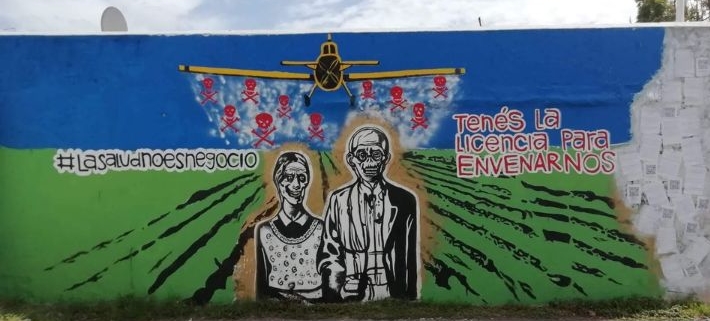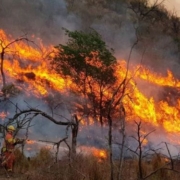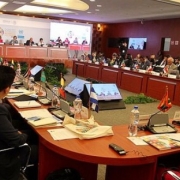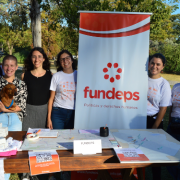Marcos Juárez: we present a protection for the use of pesticides in populated areas
Together with the community of Marcos Juárez we presented an environmental protection in the Córdoba Justice Department. We request that the current ordinance on agrochemicals be modified with the objective of expanding the protection zone, compliance with controls and the functioning of the Advisory Commission on the Environment be made effective.
“Below, we offer a google translate version of the original article in Spanish. This translation may not be accurate but serves as a general presentation of the article. For more accurate information, please switch to the Spanish version of the website. In addition, feel free to directly contact in English the person mentioned at the bottom of this article with regards to this topic”.
The application of agrochemicals in Argentina continues to be one of the main environmental problems and leads to serious contamination of water, soil, air and consequent damage to biodiversity and people’s health.
There are thousands of scientific studies around the world that prove the toxicity of these products and their link with the development of chronic diseases that affect adults and mainly children. Among them are: abnormal neurological development, cancer, increased incidence of non-hodking lymphoma, a condition in the human placenta with a probable impact on the development of abortions.
The problem of agrochemicals is no longer limited only to rural communities who see their homes, hospitals and schools fumigated daily, but affects millions of people in our country. As an example, the organization Democracia en Red, within the framework of the Pesticides Introduced Silently (PIS) project, analyzed 200 urine samples in the towns of Lobos, Saladillo, Barrio Nicole (La Matanza), Mar Chiquita and the City of Buenos Aires. Aires. The results showed that in all districts there were positive cases for glyphosate.
At Fundeps we have been addressing this problem for some time, developing and implementing different strategies to achieve adequate public policies to guarantee socio-environmental sustainability. In that sense, in 2019 we published our Agrochemical Emergency website where we systematized the immensity of socio-environmental conflicts that occur in our province from the use/misuse of agrochemicals, we also provide tools so that communities can claim for their rights. Simultaneously, we develop models of ordinances that propose restrictions on the use of these products and the creation of protection zones, seeking to promote local advances to improve the quality of community life.
Following this path, in the month of May we presented a first environmental protection for contamination with agrochemicals in Colonia Tirolesa, a process where even and despite the scientific evidence about the various health problems that the community continually suffers, no solution has been found.
Marcos Juárez: what happens with pesticides?
Marcos Juárez is a town located in the southeast of the province of Córdoba, an area known for its economic growth linked to agricultural exploitation and agroindustry, which uses large quantities of chemical products such as fungicides, herbicides, insecticides and despite the fact that Marcos Juárez has With ordinance 2446, which regulates the use and application of chemical and biological products for agricultural use and which the Municipality adheres to Provincial Law 9140, a large part of the population is exposed to these products on a daily basis.
The Marcos Juárez Ordinance arose from a process of collective struggle in 2010, when members of the community organized against the excessive fumigation with agrochemicals due to the social and health consequences caused by this form of production and that was intensifying over time. This ordinance represented a true historical milestone for Córdoba, since it establishes environmental protection zones for the application of agrochemicals. However, over the years the community began to observe that this regulation is insufficient. Added to this is the fact that the Municipality is unable to enforce compliance with this regulation (there are dozens of complaints for violations).
In this context, in 2015 the Genetics and Environmental Mutation Group belonging to the Department of Natural Sciences of the University of Río Cuarto, headed by Dr. Delia Aiassa, evaluated the level of damage to the genetic material in children exposed to pesticides. in the town. The study shows that of the total number of exposed children, 20 (40%) presented persistent symptoms of various kinds. On the other hand, he maintains: “In the case of a relatively small city, this result shows that the sprays could reach (by air) the entire town and that the vulnerable population of children is subjected to extremely high and continuous exposure, givenwho lives surrounded by crops. Taking into account that there are no differences between the groups of children under study in terms of spray distances up to a maximum of 1095 m, this information should be taken into account when establishing environmental safeguards in localities that are surrounded by crops where spraying is carried out”.
From there, and considering that the ordinance establishes distances that are well below what is recommended, for example in some high risk areas (art. 4) the exclusion zone of 150 meters (when in other locations it is 1500 meters), the community organizes itself again and begins a long journey of demands to safeguard their lives and those of their children.
In this framework, at Fundeps we began to support this legitimate claim and after a long journey we decided to go to court in search of solutions.
The Environmental Protection Action
For these reasons, by virtue of the precautionary, preventive and intergenerational equity principle, on November 27 we presented an environmental collective action before the Córdoba justice system requesting, among other things:
- The creation of an environmental protection zone no less than 1,095 meters away from the external limit of populated areas, where terrestrial fumigation is prohibited.
- And an environmental protection zone of no less than 3000 meters where fumigation of areas with any type of chemical or biological product for agricultural use is prohibited.
The purpose of this action is to safeguard and protect the rights of those who live in the town. We hope that justice, making use of the powers granted by environmental legislation, will quickly order the Municipality of Marcos Juárez to adopt concrete and urgent measures. This is essential to safeguard the community’s rights to life, health and a healthy environment.
Authors:
Katen Moldes and María Laura Carrizo
Contact:
María Laura Carrizo, lauracarrizo@fundeps.org







